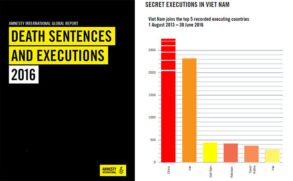This report covers the judicial use of the death penalty for the period January to December 2016. Amnesty International reports only on executions, death sentences and other aspects of the use of the death penalty, such as commutations and exonerations, where there is reasonable confirmation. In many countries governments do not publish information on their use of the death penalty, making confirmation of the use challenging.
EXECUTIONS
Amnesty International recorded a 37% decrease in the number of executions carried out globally in 2016 as against the previous year. At least 1,032 people were executed − 602 fewer than in 2015 when the organization recorded the highest number of executions in a single year since 1989 Despite the significant decrease, the overall number of executions in 2016 remained higher than the average recorded for the previous decade. These numbers
do not include the thousands of executions carried out in China, where data on the use of the death penalty remained classified as a state secret.
Iran alone accounted for 55% of all recorded executions. Together with Saudi Arabia, Iraq and Pakistan it carried out 87% of the global total. Iraq more than tripled its executions and Egypt and Bangladesh doubled theirs. New information about the number of executions carried out in Malaysia and particularly in Viet Nam provided an insight into the magnitude and true extent of their use of the death penalty. The overall number of executions carried out in Iran, however, dropped by 42% (from at least 977 to at least 567) compared to the previous year. A significant decrease in the implementation of death sentences was also recorded in Pakistan, by 73%. Executions also noticeably fell in Indonesia, Somalia and the USA. For the first time since 2006, the USA did not feature among the world’s top five executioners, due partly to litigation and challenges in sourcing chemicals used in lethal injection procedures.
Amnesty International recorded executions in 23 countries, two fewer than in 2015. Belarus and authorities within the State of Palestine resumed executions in 2016 after a year’s hiatus, while Botswana and Nigeria carried out their first executions since 2013. In 2016, Amnesty International did not record executions in six countries − Chad, India, Jordan, Oman, United Arab Emirates and Yemen − that carried out executions in 2015. The organization was unable to confirm whether judicial executions took place in Libya, Syria and Yemen.
HOW THE DEATH PENALTY WAS USED IN 2016
Public executions were carried out in Iran (at least 33) and North Korea.
Amnesty International received reports indicating that at least two people in Iran were executed for crimes committed when they were under 18 years of age. Iran also sentenced other juvenile offenders to death in 2016.
Amnesty International believed that juvenile offenders convicted in previous years remained on death row in Bangladesh, Indonesia, Iran, Maldives, Nigeria, Pakistan and Papua New Guinea. The imposition and execution of the death penalty against people who were aged under 18 when the crime was committed is a violation of international law. Often the actual age of the offender is in dispute because no clear proof of age, such as a certificate of registration at birth, exists.6
People with mental or intellectual disabilities were executed or remained under sentence of
death in several countries including Indonesia, Japan, Maldives, Pakistan and the USA.
In the majority of countries where people were sentenced to death or executed, the death penalty was imposed after proceedings that did not meet international fair trial standards.
In 2016 Amnesty International raised particular concerns in relation to court proceedings in Bangladesh, Belarus, China, Egypt, Indonesia, Iran, Iraq, North Korea, Pakistan, Saudi Arabia and Viet Nam. In several countries – including Bahrain, China, Iran, Iraq, North Korea and Saudi Arabia – some convictions and death sentences were based on “confessions” that
may have been extracted through torture or other ill-treatment. In Iran and Iraq some of these “confessions” were broadcast on television before the trial took place, further breaching the defendant’s right to presumption of innocence.







